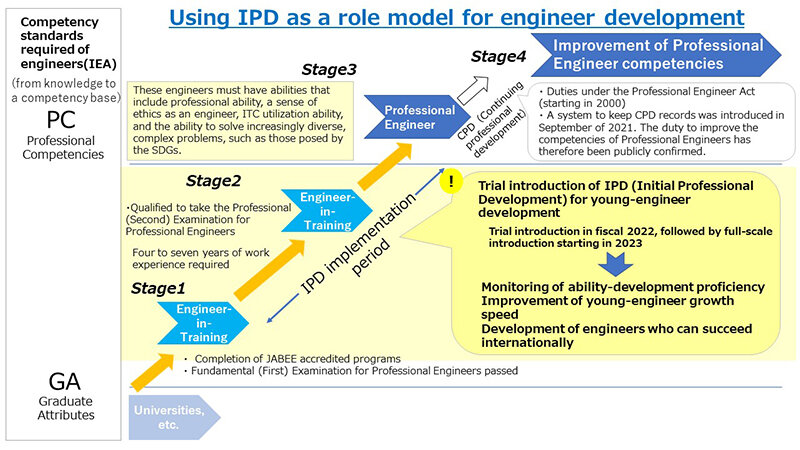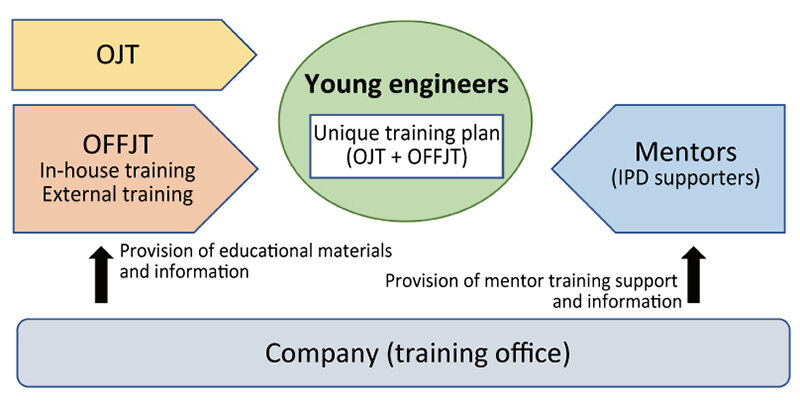2022.07.04
CTI Engineering to introduce a companywide young-engineer ability development system based on Initial Professional Development (IPD)
Sustainability
CTI Engineering Co., Ltd. has decided to introduce a companywide young-engineer ability development system based on Initial Professional Development (IPD)* in order to increase the growth speed of young engineers and develop engineers who possess the competencies necessary to succeed internationally.
* Initial Professional Development (IPD) is defined as a set of activities for improving the competencies and abilities of individuals who have finished engineering programs at institutions of higher education so that they can become Professional Engineers capable of responsibly handling business on their own. Based on a December of 2016 report by the Subdivision on Professional Engineers of the Council for Science and Technology, IPD is used as activities for Engineers-in-Training aiming to become Professional Engineers, and the oral portion of the Professional (Second) Examination is used to confirm the efforts of such individuals.
1. Current situation of engineer education at our company
Based on our Human Resources Policy and CTI Basic Policy on Human Resource Management, our company's engineer-education scheme is founded on OJT (On-the-Job Training) but also includes various types of systematic OFF JT (Off-the-Job Training). However, both OJT and OFF JT have the following two issues:
1) Such training is not based on any awareness of international standards for competencies that engineers should have.
2) There is no process for confirming when the necessary competencies have been acquired.
Our company also once spent four years trying out Kokudobunka Café: an Introductory Course for Engineers in Charge of the Future, a program based on an awareness of IPD. As a result of a questionnaire targeting students who took the course as well as their bosses, we confirmed that there is a strong need for young engineers to acquire not only professional knowledge but also a broad range of other kinds of knowledge.
2. Initial Professional Development (IPD) system to be introduced by our company
We are building our IPD System to achieve specific ability development goals--to achieve GA (Graduate Attribute) enhancement and PC (Professional Competency) acquisition, which are international standards for engineer education (see the reference materials for details), in order to increase the growth speed of young engineers and develop engineers who possess the competencies necessary to succeed internationally--and evaluate the related proficiency. Our IPD System is therefore a company system (figure 2) for supporting activities (figure 1) intended to help young engineers who have graduated from institutions of higher education to enhance their GAs and acquire PCs from the time when they get technical jobs until they acquire qualifications to become Professional Engineers.

Figure 1. Engineer career development scheme

Figure 2. IPD System
3. Ability development items compliant with international standards
We have specified 27 independent ability development items (in five categories) that should be acquired by young engineers as competencies and are based on both the PCs specified by the International Engineering Alliance (IEA) and the characteristics of construction consultant business.
1) Professional knowledge (4 items)
Universal knowledge and abilities required of engineers in relation to infrastructure development
2) Communication and collaboration (6 items)
Ability to use multiple types of media and tools during all engineering-activity processes to clearly and inclusively communicate with a wide range of stakeholders and thus collaborate with them
3) Business execution ability (8 items)
Business execution ability necessary to execute construction consultant business, including the effective utilization of professional knowledge and communication ability
4) Business management ability (5 items)
Ability to set up construction consultant business as a project and then manage the project
5) Engineer ethics (4 items)
Ability to do the following during the execution of construction consultant business: comply with the requirements of relevant laws and other systems, strive to ensure the sustainability of society, and understand that one is personally responsible for their judgement and decisions
4. IPD System operations
1) Specification of high-priority ability development items
Young engineers and their mentors (IPD supporters) will confirm the ability-development achievement goals of the young engineers for the next one to three years, and then the ability development items to focus on acquiring will be selected.
2) Training plan formulation
Training plans that include both OJT and OFF JT will be formulated as opportunities necessary for ability development. Regarding OFF JT, training offices will provide information that includes in-house training and external seminars.
3) Training activity monitoring and proficiency confirmation
Mentors will monitor training activities and evaluate proficiency.
The progress of OJT will be frequently monitored through step-review and self-assessment, the creation of materials, and at other times, and the results will be recorded.
OJT and OFF JT training activities will be monitored--such as by holding one-on-one meetings once per quarter--and the results will be recorded.
5. Schedule
July of 2022 to March of 2023: IPD System trial
Starting in April of 2023: full-scale IPD System operation (applied to applied to skill assessment in performance appraisa)
(Reference material)
GAs and PCs specified by the International Engineering Alliance (IEA)